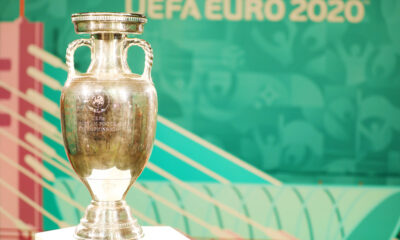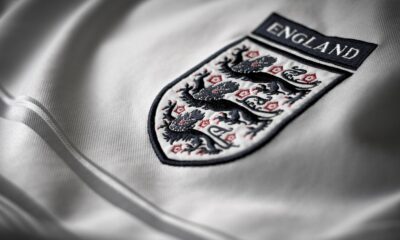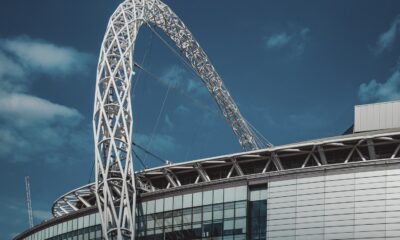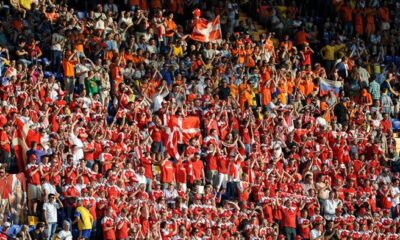Football
Mike Ashley’s Controversial Time as Newcastle Owner
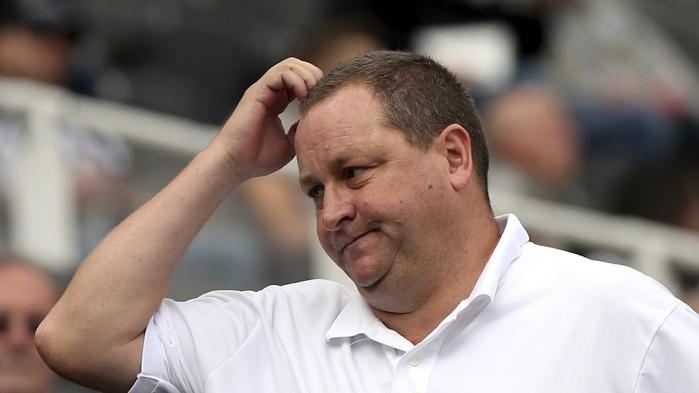
Where did it all go wrong for Newcastle under Mike Ashley’s reign?
Newcastle United. A sleeping giant residing in the north-east corner of England. A football club enriched with history and supported by a mass of passionate fans. A stadium of over 50,000 capacity, the eighth largest in the country, and an iconic black and white kit sported by many a Premier League legend. Combining all of this together, it’s incredibly difficult to understand how Newcastle owner Mike Ashley has got the majority of Tyneside loathing his fourteen years at the helm. Of course, there is no simple explanation.
The Rise to the Top
Michael James Wallace Ashley was born 9 September 1964 in Walsall, Staffordshire.
After leaving Burnham Grammar School at 16, he started to perform at a high level as a squash player. Unfortunately for Ashley, an injury halted any progression for his sports career, leading him to coach others in the racquet-based game. As his life continued, the West-Midlands-born youngster began to grow a powerful business savvy, and with the help of a loan from his family, he opened up a successful sports and ski shop. Eight years later, he owned 100 rebranded Sports Soccer stores across the country. Throughout the next decade, he rapidly acquired internationally recognised companies, such as Donnay, Lonsdale, Dunlop and Slazenger, which was merited by both capital raised through previous ownerships and private funding.
Many people across the globe have developed their own personal opinions on Ashley, however his industry intelligence is one that has registered the 56-year-old as the 61st richest man in Great Britain. The prominent businessman is now worth £2.718 billion, and is currently the Chief Executive of Frasers Group Plc. and CEO of retailer Sports Direct.
Mike Ashley's Frasers Group has confirmed it is in talks over a "potential rescue transaction" for collapsed department store Debenhams https://t.co/ICzUCnVLIb
— Sky News (@SkyNews) December 7, 2020
Becoming the Newcastle Owner
The date was 23 May 2007, and Ashley had just bought Sir John Hall’s 41.6% share in Newcastle United, setting the businessman back £55 million for said stake. A 100% ownership was achieved around two months later, after chairman Freddy Shepherd gave up his 28% followed by Ashley launching his eventual £133 million takeover of the club. This was all made possible earlier in the year when the Englishman made over £900 million from the fluctuation of the Sports Direct chain.
At the time, Ashley told the media: “Newcastle United has a wonderful heritage and the passion of its fans is legendary.
“I am sure that, like me, they are already excited about the prospects for next season under the new manager’s stewardship.”
All seemed rosy. A Forbes’ listed multimillionaire had seemingly saved this debt-ridden giant of English football, a club that was sinking due to the incompetence of its previous regime. Moreover, Ashley seemed a man of the people. It appeared that the newcomer understood the Geordie way of life, and was willing to be involved with the club’s supporters. The Newcastle owner obviously preferred casual clothing to serious attire at matches, opting to wear the club’s zebra-like strip to St. James’ Park. He’d even sat in the away section at the Stadium of Light during the ever-hostile Tyne-Wear derby, just so he was allowed to wear the black-and-white kit. Often pictured at the local pubs with a beer in hand alongside Magpie fans, the majority of the city had taken to the unconventional Michael Ashley.

Mike Ashley
Warning Signs
Criticisms of the Newcastle owner began early on into his tenure at the club. Many English football fans will famously recall the Tyneside club having their kit sponsored by British Bank Northern Rock. The company was seen as a source of pride for the city. After the collapse of both the shipbuilding and mining industries in the north, Newcastle had a company that could compete in the global economic hub. Within weeks of entering the Magpies’ governing body, Ashley was criticised by local media for not doing due diligence upon purchase, and was left oblivious to many upfront payments of club finances, including the Northern Rock sponsorship. They continued to sponsor the club until 2012, following an alteration in how the state-run bank marketed itself.
Despite this, Ashley’s popularity was redeemed after five months in charge, when he replaced the unpopular Sam Allardyce with previous manager Kevin Keegan. Returning the coach to St. James’ Park again highlighted the Newcastle owner’s supposed education in Geordie football. The ex-England manager had been highly successful on Tyneside during the 90s, delivering them from the third tier to the newly-established Premier League.
But this homecoming didn’t last long. The end of the 2009 summer transfer window saw the beginning of a feud between Keegan, Ashley, and others involved in the running of Newcastle. Arguments had reportedly spiralled between the manager and Director of Football Dennis Wise, and communication difficulties concerning Keegan and the Newcastle Owner had grown beyond repair. Two days later, the coach resigned.
Now labelled as the ‘Cockney Mafia’, the Magpies’ ownership saw multiple fan protests headed their way. The everyday-man image Ashley had seemingly tried so hard to create had been tarnished after just over a year at the helm. Ten days later came his first attempt at selling Newcastle United.
?️ Kevin Keegan: "Mike Ashley cannot treat Newcastle United like one of his shops."
? @JimWhite: "What's your message for Ashley?"
?️ Kevin Keegan: "Sell the club."#NUFC legend Kevin Keegan passionately urges Mike Ashley move on from the Magpies… #AshleyOut pic.twitter.com/bOOLFPDbJ0
— talkSPORT (@talkSPORT) October 5, 2018
‘Ashley Out’
After a 2-1 defeat to Hull City on September 14, 2009, Mike Ashley released a statement to the Magpies fanbase:
“I have listened to you. You want me out. This is what I am now trying to do.”
Former Ireland player Joe Kinnear was temporarily placed in charge of managing the first team, whilst the Newcastle owner’s search for a potential buyer commenced. A lack of success in the Middle East rendered the apparent Plan A unfeasible (not for the last time in the Ashley-Newcastle saga), and such the Newcastle United Supporters Group (NUST) was formed to portray fan’s views in preparation for any future owner. Unfortunately for everyone involved, no acceptable buyer was found, despite circulating rumours surrounding the idea of a fan-owned football club.
So began a truly woeful season for the Magpies. After several months in charge, Kinnear was offered a full-time role as manager, despite the fact his team were sat just two points clear of the relegation zone. Newcastle’s luck got no better. The following month the coach was the victim of heart problems, and subsequently left his role at the club. In what looked like another popularity move rather than a thought-out business decision, Toon and English football legend Alan Shearer was appointed as manager with eight games left of the campaign. With only five more points collected by the season’s conclusion, Newcastle United were relegated to the Championship for the first time since their top tier arrival back in 1993. It’s almost impossible to assume a more experienced manager would have prevented relegation, with tales of players’ dreadful attitudes and staff turmoil circulating around said team until present day.
The Second Attempt
In a deal that seemed increasingly crucial by the hour, Ashley placed the Tyneside club on the for-sale list for the second time in the space of a year. The Newcastle owner’s business savvy seemed to be dwindling by the day, as he continued struggling to find any suitors for a now second-tier football club. The TV rights had gone. The manager had left. Newcastle United were not in a favourable position when looking for investment – the potential for greatness still remained, but serious funding was needed to have taken this sleeping giant to its rightful place in the sporting world.
Despite rumours of local businessman Barry Moat setting up negotiations with Ashley, the club was re-taken off of the market just two months later, again failing to find a buyer. To make matters even worse, the then-44-year-old was forced to pay Keegan £2 million in compensation by a Premier League arbitration panel for his supposed mistreatment at the club. The situation seemed to be spiralling into hysteria.
Then came a new statement:
“Mike Ashley is totally committed to the future success of Newcastle United and will be focused on gaining promotion back to the Premier League. Mike will put a further £20m into the club this week.”
After previously admitting to fans that he lacked the knowledge to truly run a football club successfully, the sudden U-turn came as an enormous shock to the sporting world. Just a week before Ashley had highlighted his shortcomings within the industry, now the future of the entire club had been hoisted back upon his shoulders.
A New Start?
With news that St. James’ Park was to be retitled in an attempt to raise funds and sell the rights to its name, fans grew additionally irritated at their owner. Rebranded after Ashley’s company Sports Direct, it felt like the city’s heritage was slowly being stripped away from them, which can only have been heightened by a lack of top-flight football.
Despite the rocky start, Newcastle United bounced back to the Premier League at the first time of asking, achieving pole position in the second tier during the process. Under the highly competent management of Chris Hughton, the Magpies stormed the Championship with ease, finishing the season on an insane 102 points, losing only four games in the process. Many experienced pros at the club could not wait to leave following the previous season’s relegation, but the Irish coach managed to instil a harmony amongst those who remained in an incredible manner.
After the likes of Cheick Tioté, Dan Gosling and experienced defender Sol Campbell were brought in during the summer, Newcastle found themselves eleventh in the table as the winter closed in. Hughton was seemingly turning the tide at the ‘Sports Direct Arena’, making the decision to sack the manager on 6 December frankly astonishing.
The club announced that they were looking for someone “with more managerial experience” to take them to the next level. Even if true, outraged fans could still not comprehend why this judgement had been made.
Hughton’s former number two Colin Calderwood obviously knew of goings on at the club, and spoke on Radio 5 Live the next day.
He said: “There’s a great deal of shock but it’s not unexpected because of the knowledge I had when I was there and the regime that he [Hughton] was working under.
“You want to know the parameters of the job and they keep changing. You’re not allowed to do what you think is feasible and logical then it becomes very difficult to do your job.”
Calderwood also mentioned in the same interview that understood budgets at the club were constantly changing, providing football fans around the world with the evidence that only confirmed their thoughts on the Newcastle owner.
Respected journalist Phil McNulty was one of many who spoke out against the ‘Cockney Mafia’, blogging:
11 years ago to the day. Chris Hughton was appointed manager of Newcastle United, and what a job he did.
One of the men who saved #NUFC pic.twitter.com/XQag2CiOhu— Newcastle Fans TV (@NewcastleFansTV) October 27, 2020
Consistent Mediocrity
Over the next decade, the Magpies saw nine years of Premier League football. A constant argument amongst fans of the sport has been ‘should Newcastle expect anything more?’ As mentioned, the club does withhold the potential to compete with the best after you combine the stadium, the fanbase, and the amount of capital Ashley actually holds at his fingertips. But does this give them the god-given right to achieve better?
Following the Hughton debacle, former Southampton manager Alan Pardew was appointed to lead the first team, under whom the Tyneside club experienced their most successful season since the owner’s arrival. Finishing fifth in the table, Newcastle found themselves in a Europa League qualifying position, just two years since playing second division football.
Incredibly, Pardew was hounded by thousands of supporters at home games just a year later, after his side lost 15 of 21 matches in the second half of the season. Eventually leaving for Crystal Palace, it seemed everything great had to come to an end at Newcastle. Years of bottom half finishes followed, aggravating the passionate fan base even further. Just before suffering their second Premier League relegation in 2016, Ashley gave Sky Sports viewers another warming insight, stating he regretted purchasing the club in the first place.
Although bouncing straight back up again under popular figure Rafael Benitez, the Toon Army grew exhausted from a lack of ambition and often unexciting football at St. James’ Park. Turgidity only cultivated under current manager Steve Bruce, although a glimmer of hope had begun to shine from the direction of Saudi Arabia.
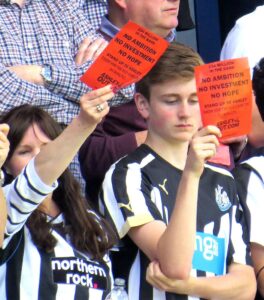
Newcastle United Fans desperate for a change in ownership
Newcastle Takeover – Bin Salman eyes the Toon?
Just weeks after the turn of the decade, reports started to circulate that Saudi Arabia’s sovereign wealth fund could be a means of purchase for the Tyneside club. After negotiations continued between Ashley and the country’s Public Investment Fund through a shell company, an agreement seemed imminent. Stories of an established sum began to surround the discussions, and it was reported a £300 million takeover was soon to announced by the Middle-Eastern consortium.
Fan excitement bellowed. Photoshops of Mbappe and Neymar in black-and-white did the rounds on social media, following the news that Newcastle could become the richest club in England by a considerable amount. Supporters waited eagerly in anticipation, although even the most optimistic of Magpie fans have learnt that nothing is straightforward on Tyneside. A Premier League panel were to discuss the human rights behind an already-controversial takeover.
It seemed league officials were concerned over who would be behind potential decision-making at the club once the purchase was complete. The Saudi Crown Prince acted as the chairman for the investment fund, someone in charge of a state who had recently been found guilty by the WTO as breaching international privacy laws. Human rights groups also strongly opposed any deal being completed, as well as the fiancée of murdered journalist Jamal Khashoggi, although Crown Prince Mohammed bin Salman had denied any involvement repeatedly.
Half a year onward, it was confirmed the consortium had pulled out of their bid for the club “with regret.” A decision out of Ashley’s control had been made, one that had its critics on both sides of the argument. The club’s loyal fans again felt wronged, an emotion the city had all but gotten used to by now.
Newcastle new owner – is it likely to happen?
Despite a COVID climate, protests in Newcastle and indeed England continue to rage on. Last Friday saw banners held up outside 10 Downing Street, still backed by the anger of the failed Saudi takeover. The latest news has also seen a Premier League tribunal be adjourned from the coming weeks until early 2022, which will decide whether or not the takeover should have been allowed last year.
From an outsider point of view, it seems all that Magpie fans crave is an exciting and ambitious team, one that the city can be truly proud of. One that they have been denied so far under this ‘leadership’. One that most believe cannot be achieved whilst ruled by Mike Ashley. Often preceded by the preposition ‘out’, his name riles outrage amongst the majority of Geordies, a reputation so tarnished that a 90th minute winner on Wearside couldn’t rescue the owner’s legacy.
Club Update
The main hearing of the arbitration in the case between Newcastle United and the Premier League has regrettably now been adjourned until early 2022 due to issues with the disclosure of evidence.
— Newcastle United FC (@NUFC) July 19, 2021
We hope you enjoyed the article ‘Mike Ashley’s Controversial Time as Newcastle Owner.’ Do you think the Newcastle Owner will be able to sell the club soon? Let us know!
Read more on football here:
-

 News1 month ago
News1 month agoThe Best Male Tennis Players of All Time
-

 Uncategorised1 month ago
Uncategorised1 month agoWhat Dinosaur Has 500 Teeth?
-

 News1 month ago
News1 month agoThe Fastest Rugby Players Ever
-

 Football1 month ago
Football1 month agoThe Best Penalty Takers of All Time
-

 Football1 month ago
Football1 month ago10 of the most underrated footballers in the world right now
-

 Football1 month ago
Football1 month agoPlayers with the most goals in a Premier League season
-

 Football1 month ago
Football1 month agoWho is the Fastest Football Player in the World?
-

 Football1 month ago
Football1 month agoChelsea’s Possible Lineup For Next Season


